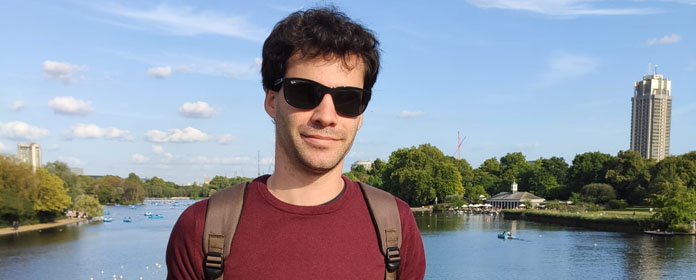News
LATEST NEWS AND EVENTS FROM THE SCHOOL OF ENGINEERING
"Spending time living in another country is always a positive experience."
Sergio Ruiz de Galarreta has spent 6 months at the Imperial College of London.

Sergio Ruiz de Galarreta has spent six months at department of Mechanical Engineering of the Imperial College of London (UK). Specifically in the Biomechanics Group. This group is composed of about 25 researchers (professors, post-docs and doctoral students) and is mainly dedicated to applying engineering techniques to solve current orthopedic problems and develop new orthopedic components.
What has the work consisted of?
First, we would like to briefly explain the research work that we are carrying out at area of Structures of Tecnun. One of our research lines is the study of the behavior of a subject of porous Structures (Structures lattice) for its application in orthopedic implants. The fabrication of these Structures with high precision is now possible thanks to the development that has taken place in recent years in the field of Additive Manufacturing. One of the advantages of these Structures is that they can reduce the stiffness of orthopedic implants, thus resembling the stiffness of bone and thus avoiding a negative effect known as "stress shielding" whereby the bone starts to disappear, creating a gap between the bone and the implant and causing pain in the patient. Another advantage of these Structures is that their porosity benefits the circulation of nutrients and bone growth.
The work I have carried out during the stay has been mainly experimental. We have fabricated 100 Structures with different geometries and porosities by selective laser melting, one of the FA technologies for metals. To get an idea, these Structures are composed of bars with diameters around 200 microns. Subsequently, after analyzing the surface of the Structures using scanning electron microscopes, we experimentally obtained the stiffness of these Structures through compression tests and determined a model to define their behavior based on different geometrical parameters. All this information is of vital importance to design the optimal orthopedic implant taking into account the desired stiffness and pore size.
What conclusions have you drawn from the experience?
The truth is that spending time living in another country is always a positive experience. I have been lucky enough to have spent 6 months living in Sweden, 6 months in the United States and now 6 months in the United Kingdom and they all bring something different. What they all have in common is something that we already know very well, which is to realise how good the food is in the Basque Country.
As for the experience in London, the conclusions I draw are positive. First of all, being able to work with a group that already has great experience in this area is always a plus and you learn a lot. Sharing weekly meetings with them, was like attend to a discussion paper of a congress, after all, each one presented the work done during the last 4-5 months, and therefore it was a very complete work. These presentations and the subsequent discussion give you a lot of ideas and also solve some doubts you might be stuck on.
As for life in London, the truth is that life is quite good, there are many parks for sports, good shows, museums, restaurants of any country... but I'm still more of a small city person, I don't like the hustle and bustle of the underground at rush hour.
Have you seen similarities with Tecnun in the way they work?
The truth is that the way of working is quite similar to that of Tecnun, although it is true that it is a larger group with more funding and therefore the research they carry out is more experimental. What I found similar to Tecnun is the availability of everyone to lend a hand in anything. From the first day I arrived some colleagues explained me a couple of programs that could be useful for the work I wanted to do and this financial aid between colleagues was seen in the day to day. As in Tecnun, the students of Degree and the master's degree also collaborated in the research.
Any funny or amusing anecdotes that have happened to you during this time?
At Tecnun we have only been doing this line of research for a short time and therefore we have not yet been able to manufacture any orthopaedic implants. This is not the case at Imperial College. The first thing I saw when I arrived at the office was a shoulder implant that was being used as a door stop. I thought about taking it, but I don't think it would look aesthetically pleasing on the office door, so I left it. A little later I went down to the lab. It should be noted that his research group is made up of engineers and surgeons. I walked into the lab and saw a couple of colleagues forcing the knee of a human being to the point of breaking it. Then I got used to it and it was usual to see colleagues working with 'pieces' of leg and so on, but the first day was shocking.
And I will tell a couple of slightly more negative anecdotes. In summer the group's activity was axe throwing. Although I'm not from Bilbao, before going I showed off a bit and told them that here in the Basque Country we control that a lot and I showed them some video of 'aizkolaris'. result of the test; we were 23rd out of 24 ... and to pay a round of pints. And the second thing is to see that playing soccer on uneven ground can damage your hip. Who knows, maybe the first hip prosthesis we design in the area of Structures will be for a patient named Sergio Ruiz de Galarreta, coincidences of life...
